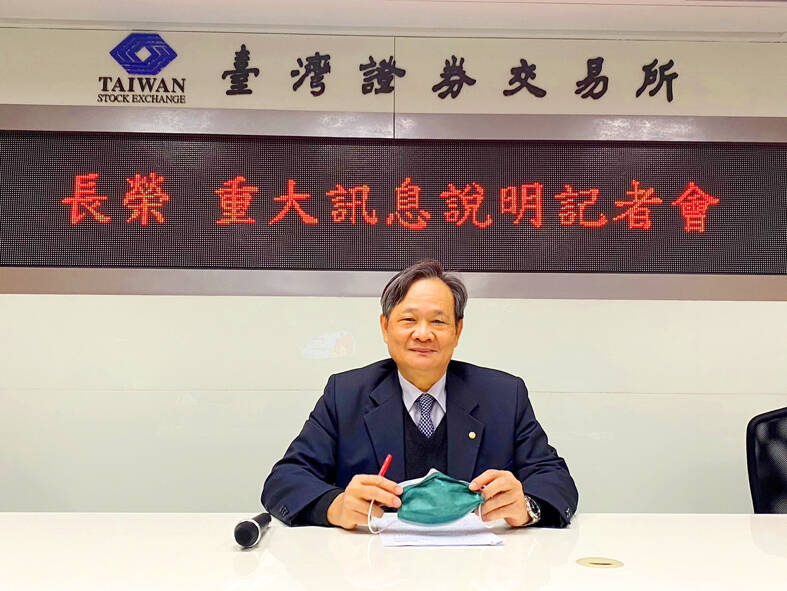Evergreen Marine Corp (長榮海運) yesterday said that it has acquired a 10 percent stake in Charing Yang Development Co (長陽開發) for NT$450 million (US$14.67 million) as the nation’s largest container cargo shipper aims to seek stable dividend income.
The investment raises Evergreen Marine’s stake in Charing Yang Development to 50 percent, company president Eric Hsieh (謝惠全) told a news conference in Taipei.
Hsieh said Evergreen Marine increased its investment in Charing Yang, as the developer has reported stable profit growth and dividends in the past few years on the back of rent revenue from department stores in central Taoyuan.

Photo: CNA
The shipper expects the value of real estate in the area to increase, he said.
Evergreen Marine has also decided to purchase two office buildings in Taoyuan from Evergreen International Corp (長榮國際) for NT$4.74 billion, Hsieh said.
The property purchase is for the shipper’s own use and aims to reduce rental costs while seeking investment gains, he said.
Commenting on the outlook of the cargo shipping sector, Hsieh said that Evergreen Marine has seen demand rebound from last month, with its load factor rising above 90 percent this month following the easing of COVID-19 restrictions in China.
Freight rates on some routes have decreased at a slower rate, while some have begun to recover, he said.
With some of its peers planning to charge higher fees from next month, Evergreen Marine plans to follow suit by imposing an additional fee of US$1,000 per container on US routes, given rising demand, Hsieh said.
“Business should be rosy before the Lunar New Year holiday,” he said.
Next year, Russia’s invasion of Ukraine and the implementation of stricter emissions rules by the International Maritime Organization would affect the shipping market the most, Hsieh said.
Evergreen last month reported a double-digit annual fall in revenue to NT$36 billion, but its cumulative revenue still rose 37 percent to NT$597 billion for the first 11 months of this year thanks to strong revenue growth in the first half of this year, company data showed.

CHIP RACE: Three years of overbroad export controls drove foreign competitors to pursue their own AI chips, and ‘cost US taxpayers billions of dollars,’ Nvidia said China has figured out the US strategy for allowing it to buy Nvidia Corp’s H200s and is rejecting the artificial intelligence (AI) chip in favor of domestically developed semiconductors, White House AI adviser David Sacks said, citing news reports. US President Donald Trump on Monday said that he would allow shipments of Nvidia’s H200 chips to China, part of an administration effort backed by Sacks to challenge Chinese tech champions such as Huawei Technologies Co (華為) by bringing US competition to their home market. On Friday, Sacks signaled that he was uncertain about whether that approach would work. “They’re rejecting our chips,” Sacks

NATIONAL SECURITY: Intel’s testing of ACM tools despite US government control ‘highlights egregious gaps in US technology protection policies,’ a former official said Chipmaker Intel Corp has tested chipmaking tools this year from a toolmaker with deep roots in China and two overseas units that were targeted by US sanctions, according to two sources with direct knowledge of the matter. Intel, which fended off calls for its CEO’s resignation from US President Donald Trump in August over his alleged ties to China, got the tools from ACM Research Inc, a Fremont, California-based producer of chipmaking equipment. Two of ACM’s units, based in Shanghai and South Korea, were among a number of firms barred last year from receiving US technology over claims they have

It is challenging to build infrastructure in much of Europe. Constrained budgets and polarized politics tend to undermine long-term projects, forcing officials to react to emergencies rather than plan for the future. Not in Austria. Today, the country is to officially open its Koralmbahn tunnel, the 5.9 billion euro (US$6.9 billion) centerpiece of a groundbreaking new railway that will eventually run from Poland’s Baltic coast to the Adriatic Sea, transforming travel within Austria and positioning the Alpine nation at the forefront of logistics in Europe. “It is Austria’s biggest socio-economic experiment in over a century,” said Eric Kirschner, an economist at Graz-based Joanneum

France is developing domestic production of electric vehicle (EV) batteries with an eye on industrial independence, but Asian experts are proving key in launching operations. In the Verkor factory outside the northern city of Dunkirk, which was inaugurated on Thursday, foreign specialists, notably from South Korea and Malaysia, are training the local staff. Verkor is the third battery gigafactory to open in northern France in a region that has become known as “Battery Valley.” At the Automotive Energy Supply Corp (AESC) factory near the city of Douai, where production has been under way for several months, Chinese engineers and technicians supervise French recruits. “They